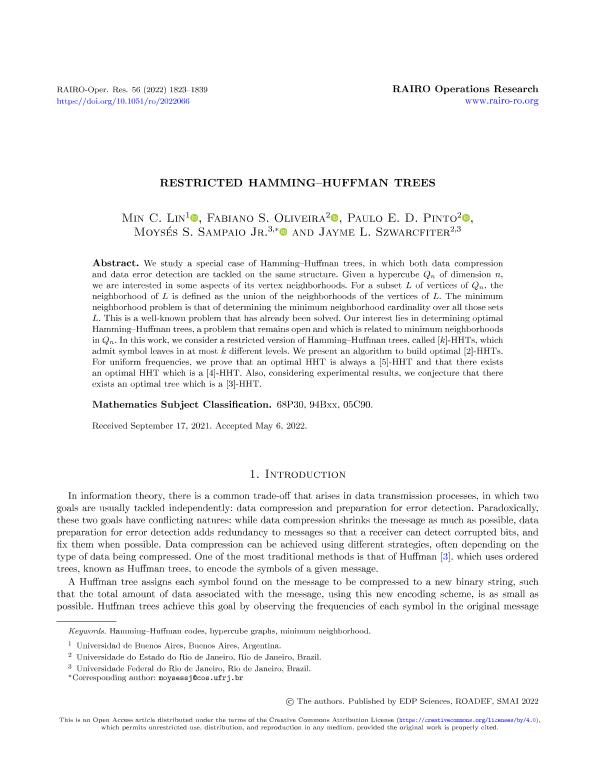Mostrar el registro sencillo del ítem
dc.contributor.author
Lin, Min Chih

dc.contributor.author
de Souza Oliveira, Fabiano

dc.contributor.author
Pinto, Paulo E. D.
dc.contributor.author
Sampaio, Moysés S.
dc.contributor.author
Szwarcfiter, Jayme L.

dc.date.available
2023-07-13T10:48:07Z
dc.date.issued
2022-06
dc.identifier.citation
Lin, Min Chih; de Souza Oliveira, Fabiano; Pinto, Paulo E. D.; Sampaio, Moysés S.; Szwarcfiter, Jayme L.; Restricted Hamming-Huffman Trees; EDP Sciences; RAIRO - Operations Research; 56; 3; 6-2022; 1823-1839
dc.identifier.issn
2804-7303
dc.identifier.uri
http://hdl.handle.net/11336/203619
dc.description.abstract
We study a special case of HammingHuffman trees, in which both data compression and data error detection are tackled on the same structure. Given a hypercube Qn of dimension n, we are interested in some aspects of its vertex neighborhoods. For a subset L of vertices of Qn, the neighborhood of L is defined as the union of the neighborhoods of the vertices of L. The minimum neighborhood problem is that of determining the minimum neighborhood cardinality over all those sets L. This is a well-known problem that has already been solved. Our interest lies in determining optimal HammingHuffman trees, a problem that remains open and which is related to minimum neighborhoods in Qn. In this work, we consider a restricted version of HammingHuffman trees, called [k]-HHT s, which admit symbol leaves in at most k different levels. We present an algorithm to build optimal [2]-HHT s. For uniform frequencies, we prove that an optimal HHT is always a [5]-HHT and that there exists an optimal HHT which is a [4]-HHT. Also, considering experimental results, we conjecture that there exists an optimal tree which is a [3]-HHT.
dc.format
application/pdf
dc.language.iso
eng
dc.publisher
EDP Sciences

dc.rights
info:eu-repo/semantics/openAccess
dc.rights.uri
https://creativecommons.org/licenses/by/2.5/ar/
dc.subject
HAMMINGHUFFMAN CODES
dc.subject
HYPERCUBE GRAPHS
dc.subject
MINIMUM NEIGHBORHOOD
dc.subject.classification
Ciencias de la Computación

dc.subject.classification
Ciencias de la Computación e Información

dc.subject.classification
CIENCIAS NATURALES Y EXACTAS

dc.subject.classification
Matemática Aplicada

dc.subject.classification
Matemáticas

dc.subject.classification
CIENCIAS NATURALES Y EXACTAS

dc.title
Restricted Hamming-Huffman Trees
dc.type
info:eu-repo/semantics/article
dc.type
info:ar-repo/semantics/artículo
dc.type
info:eu-repo/semantics/publishedVersion
dc.date.updated
2023-07-03T16:26:46Z
dc.journal.volume
56
dc.journal.number
3
dc.journal.pagination
1823-1839
dc.journal.pais
Francia

dc.journal.ciudad
Paris
dc.description.fil
Fil: Lin, Min Chih. Universidad de Buenos Aires. Facultad de Ciencias Exactas y Naturales. Instituto de Calculo. - Consejo Nacional de Investigaciones Científicas y Técnicas. Oficina de Coordinación Administrativa Ciudad Universitaria. Instituto de Calculo; Argentina
dc.description.fil
Fil: de Souza Oliveira, Fabiano. Universidade do Estado de Rio do Janeiro; Brasil
dc.description.fil
Fil: Pinto, Paulo E. D.. Universidade do Estado de Rio do Janeiro; Brasil
dc.description.fil
Fil: Sampaio, Moysés S.. Universidade Federal do Rio de Janeiro; Brasil
dc.description.fil
Fil: Szwarcfiter, Jayme L.. Universidade Federal do Rio de Janeiro; Brasil. Universidade do Estado de Rio do Janeiro; Brasil
dc.journal.title
RAIRO - Operations Research

dc.relation.alternativeid
info:eu-repo/semantics/altIdentifier/doi/https://doi.org/10.1051/ro/2022066
dc.relation.alternativeid
info:eu-repo/semantics/altIdentifier/url/https://www.rairo-ro.org/articles/ro/abs/2022/03/ro210431/ro210431.html
Archivos asociados
